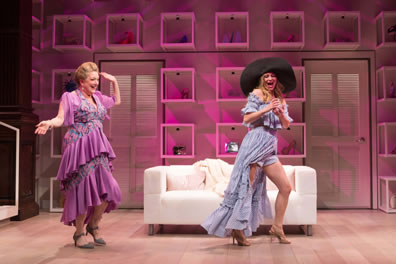The Way of the World (adaption)
Money Talks
Written by Theresa Rebeck
The Folger Theatre, Washington, D.C.
Thursday, February 1, 2018, F–8&10 (right center stalls)
Directed by Theresa Rebeck

Henry (Luigi Sottile, left) and Charles (Brandon Espinoza) enjoy their blue martinis at an East Hamptons bar in the Folger Theatre's production of Theresa Rebeck's The Way of the World. Below, Rene (Kristine Nielsen, left) gets playful with her niece, Mae (Eliza Huberth). Photos by Teresa Wood, Folger Theatre.
Neither have I read nor seen The Way of the World, William Congreve's 1700 comedy of manners, marriage, and money, which Theresa Rebeck has rewritten for the modern setting of the East Hamptons (the wealthy enclave for New Yorkers on Long Island). Rebeck also reshaped Congreve's play to widen the women's point of view, and as such the Folger Theatre chose this makeover of a late-Restoration Era classic as its entry in the Capitol Region's second Women's Voices Theater Festival.
I do, however, have intimate knowledge of one scene in the play: the Waitress (Ashley Austin Morris) describing work with a catering company. During parties at the mansions and country clubs, the Waitress carries trays of drinks or hors d'oeuvres that may as well be floating through the air, for she is invisible. This is a truth. I once was assigned by Midwest Living magazine to do a profile on a caterer in Ohio, and as part of my research I donned the server's tux and, with quick training, worked a Christmas party for a wealthy client. The hosts knew I was a journalist (and approved my presence), but none of the guests did. Other than being the butt of a bad joke, I didn't exist beyond the tray I carried.
Rebeck trims out much of the convoluted plot and circumstances typical of a Congreve play and gets to the comedy's core theme: love and sex as a commodity in a society where money is what matters most. Mirabell and Millamant have become Henry (Luigi Sottile) and Mae (Eliza Huberth): she, a young woman reportedly due a $600 million-plus inheritance; he, a cad pretty much cut loose from his moneyed family. Their companions are pop culture emojis: Katrina (Erica Dorfler), the young, self-centered, fashion-sensitive (in clothes and diet) socialite; Charles (Brandon Espinoza), the angry gay who hates women and crushes on a straight guy; Lyle (Daniel Morgan Shelley), the sensitive gay African American from a wealthy Boston family; and Reg (Elan Zafir), a crude, party-harder loudmouth. The centerpiece role is that of Rene (Kristine Nielsen), Mae's aunt and the gatekeeper of her trust fund. The ultimate 21st century aristocrat with an omnipresent flightiness, Rene most represents the 1 percenters, spending for spending's sake, maintaining image for image's sake, and being wealthy as a matter of civic duty to the poor (she considers being rich the nation's only successful jobs creation program because she can hire workers to paint her lawn green, for example).
The unnamed Waitress represents the rest of us 99 percenters, interrupting the action for monologues (Morris's bio includes work as a stand-up comedian) about working six jobs among all these cool rich people and inside their totally awesome mansions and all the beautiful things they have and don't even know they have because they have so many such beautiful things. She exalts in witnessing all of this even though the pay from her six jobs hardly covers her long commutes to work. It's a formula that spells trouble, being invisible in these awesome homes with so many beautiful things the cool rich people don't even remember they have. Midway through the play the waitress also reports that she has a boyfriend, kind of—they slept together once. This turns out to be a plot point, as that one-night stand is Henry, who has the distinction of having sex during or before the play with each of the play's other characters except Lyle and Reg.
It is his sexual tryst with Rene while dating Mae that has Henry thrown out of Mae's life. I get how that can tick off both women. Henry keeps insisting he was just trying to be nice to the old lady while his friends actually wonder if bedding the aunt was part of his scheme to marry Mae and get her money. But, no, his behavior throughout the play reveals him to be an in-the-moment kind of guy until something comes along and makes him take a longer-track view of his and his society's worthiness.
That something is Mae. Mae couldn't care less about her wealth. In fact, she plans to give her entire fortune to help people in Haiti. She speaks in earnest, but Huberth's portrayal depicts an intellectually shallow young woman. She's certain she can give away all her money and work like most people do, which is true, but the Waitress is the obvious juxtaposition to this heroic ideal. Mae disdains fashion but lets her aunt and friends dress her. When she finally wears comfortable sandals, being subsequently labeled a lesbian annoys her, and in her next scene she's back in spiked heels and a dress she considers too tight to breathe in.
Rebeck's ultimate theme, echoing Congreve's, is the dehumanizing nature of wealth. People are measured by the commodities they wear, carry, or have about them, and love is measured in dollar figures; this applies to romantic love and, most pointedly, to family love, too. Sex is just another commodity, and affection, whether you are an opportunistic cad, a gay prowler, or an aunt, is the key to resources needed to live big. Unfortunately (though perhaps purposefully), this lack of human feeling extends to the audience. Most of the performances, like the characters themselves, are mere showcases of image, though Nielsen lands laughs with her flighty behavior as Rene—until Rene shows that flightiness to be, itself, just an image for public consumption.
This broad judgment may not be fair to Shelley's Lyle, as he seems sincere in his behavior, though he does knowingly participate in a scheme to distract Rene so Henry can make another play for Mae. The other character who rises above the money scrum—ultimately, if not in the beginning—is Henry. Notably, he is the only one who sees the Waitress as anything other than the conduit to better food or more drinks (Henry and the Waitress actually have a real conversation after the sex, and a mutually beneficial relationship beyond that, too).
 This production scores with casting Sottile as Henry, the one role requiring human nuances. We saw Sottile as the male half of the Signature Theatre production Sex with Strangers, and that performance along with this one prove him to be a whole-body actor, exuding sexiness, confidence, confusion—whatever emotion he's grappling with—through his very pores. The part of Henry requires an actor who can show us that he's truthfully fallen in love with Mae because the script carries no insurance that he is not scamming us, too. Sottile pulled off the same emotional track in Sex with Strangers, and his performance in The Way of the World solidifies his sensitive hunk cred.
This production scores with casting Sottile as Henry, the one role requiring human nuances. We saw Sottile as the male half of the Signature Theatre production Sex with Strangers, and that performance along with this one prove him to be a whole-body actor, exuding sexiness, confidence, confusion—whatever emotion he's grappling with—through his very pores. The part of Henry requires an actor who can show us that he's truthfully fallen in love with Mae because the script carries no insurance that he is not scamming us, too. Sottile pulled off the same emotional track in Sex with Strangers, and his performance in The Way of the World solidifies his sensitive hunk cred.
The production's other strengths are in its designers. Scenic Designer Alexander Dodge has built a versatile set (center backdrop turning around to switch from public spaces to bedrooms) with a wall of display cases filled with purses, shoes, glassware, and porcelain statuary—the beautiful stuff of which the Waitress is so enamored. Costume Designer Linda Cho marries Congreve's era with the ultrafashion of the vacationing wealthy. The women wear fly-away dresses (in a sense, half of the 16h century's hoopskirts), and the men are in multicolored jackets, knee britches (well, shin britches), and even a puffy cavalier style shirts for Henry and Charles. Rene assures Mae that the outfit she's wearing is "timeless," to which Mae cracks that "Timeless is stupid." And these fashionistas do look ridiculously loud.
The drink of choice (other than Reg with his beers and the wine at the modern art exhibit) are blue martinis, made from a blue curaçao liquor developed by a Dutch distiller in Congreve's time. That's how money talks. It's just the way of the world—has been for some time.
Eric Minton
February 6, 2018
Comment: e-mail editorial@shakespeareances.com
Start a discussion in the Bardroom



 Find additional Shakespeareances
Find additional Shakespeareances